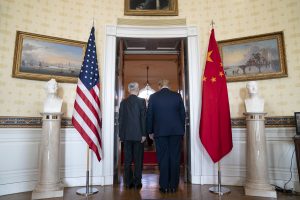With the fallout from the coronavirus further straining U.S.-China relations, the brief détente the two superpowers enjoyed after signing a Phase One trade agreement in January has all but disappeared. When the agreement was signed, it was evident that China’s commitment to purchase an additional $200 billion in U.S. goods and services over the next two years was unrealistic. Amid a potential global depression in the wake of the pandemic, the deal is dead on arrival, but both governments claim they are committed to implementing it.
When the global economy begins its long and arduous recovery, the United States needs to shift its strategy in the trade war to address the core concerns that prompted the economic conflict, such as Chinese industrial espionage, noncompetitive practices of state-owned enterprises (SOEs), and China’s expansive system of industrial subsidies. It will be tempting for the Trump administration to turn to tariffs once again to increase pressure against China, but this cannot be the policy moving forward.
During the height of the trade war, tariffs disrupted supply chains, created uncertainty for firms, raised costs for consumers, and caused global growth to slow. A fresh round of tariffs would be even more harmful — they would derail the fragile global recovery and impose additional costs on Americans as unemployment skyrockets and savings are drained by the economic consequences of the coronavirus. It would also threaten the implementation of the Phase One agreement further. Instead, the United States should leverage its alliances to form a coalition to counter unfair Chinese economic practices and cement its economic interests in the Asia-Pacific.
First, the United States Trade Representative (USTR) should expand the U.S.-EU-Japan trilateral trade ministers’ meetings to include Australia, Canada, South Korea, and a post-Brexit United Kingdom. Although the United States has largely taken a unilateral approach to combatting unfair Chinese economic practices under the Trump administration, the trade trilateral offers the blueprint to more robust cooperation with allies. Since December 2017, the three partners have met intermittently to “enhance trilateral cooperation” with the aim of addressing “unfair market distorting and protectionist practices.” In January, the three-member group agreed to World Trade Organization (WTO) reforms on subsidies notification and transparency, addressing a shared concern over China’s system of state subsidies and noncompliance with WTO rules. Together, an expanded coalition would make up 55 percent of the world economy and roughly the same proportion in global trade. The United States should urge the new coalition to endorse these reforms at a future Camp David G-7 meeting before launching a WTO complaint and attempting to reach a G-20-wide consensus on subsidies.
Second, the United States should establish a multilateral working group including the European Union, Japan, South Korea, and members of the Five Eyes intelligence alliance to align export control and investment screening regimes. In 2018, Trump signed reforms strengthening U.S. safeguards against economic activities that threaten national security. By coordinating these policies with allies, the United States can expand its high standards for investments and export controls to like-minded partners. This coalition would signal to Chinese firms that they risk exclusion from these markets unless China reforms its unfair economic practices.
Lastly, the United States should launch exploratory free trade talks with emerging markets in the Indo-Pacific to strengthen economic ties to the region. Since withdrawing from the Trans-Pacific Partnership (TPP), the United States has lacked a credible response to counter China’s economic influence in emerging Asia. With China close to signing the Regional Comprehensive Economic Partnership (RCEP) and the Trump administration’s dislike of multilateral trade deals, the United States needs to begin bilateral talks with countries such as Indonesia, Malaysia, the Philippines, Thailand, and Vietnam. A spate of high-quality trade agreements would advance America’s economic presence in the region, an opportunity that was relinquished when the Trump administration withdrew from the TPP.
These policies are not a panacea. For the United States to effectively rally its allies to counter China’s economic threat it needs to rebuild alliances that have been strained over the last four years. U.S. allies share concerns over Chinese technological ascendance and its unfair economic practices but have grown increasingly frustrated with the United States’ use of economic statecraft targeting trusted partners. The Trump administration’s plan to develop an “Economic Prosperity Network” could be promising but the United States should continue by rolling back tariffs on steel, aluminum, and autos against allies before deepening economic integration. While China has not hesitated to retaliate against U.S. allies using economic tools – against South Korea in 2017 over the THAAD missile system, Canada after the arrest of Huawei CFO Meng Wanzhou, and Australia following its call for an investigation at the WHO into the origins of the coronavirus – Beijing cannot risk engaging in a simultaneous trade war with countries that make up nearly 60 percent of the global economy.
The COVID-19 pandemic has the potential to be a system-altering event that accelerates existing trends and destabilizes the liberal international order. If the United States turns to tariffs once again and fails to build a coalition to counter China’s economic influence, it risks weakening both its global standing and the recovery from the pandemic. These policies are an important first step to demonstrate that the United States and its allies are committed to addressing distortionary Chinese economic practices without jeopardizing the impending economic recovery. By using multilateral tools as opposed to unilateral tariffs, the United States can minimize retaliation and maximize pressure.
Mayaz Alam is a graduate of the Master of Science in Foreign Service program at Georgetown University, where he focused on economic statecraft. He was previously a journalist with The Globe and Mail. He tweets at @mayazalam16

































